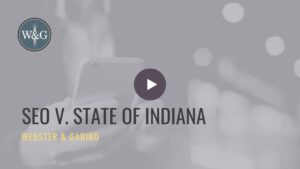Will Webster Breaks Down Katelin Seo vs State of Indiana Case
Since April 2019, William Webster of Webster & Garino in Westfield, Indiana, has awaited the decision of the Indiana Supreme Court in Katelin Seo v. State of Indiana. He delivered oral arguments on behalf of the defendant, and recently took some time to explain the importance of the case to the public. He emphasized that the outcome of this Indiana cell phone case could influence the rights of anyone who has a mobile electronic device.

The cell phone Supreme Court case started when Mr. Webster represented Ms. Seo, who was being investigated for intimidation and harassment. A search warrant ordered her to unlock her iPhone 7 so that law enforcement could download its contents and look for evidence against her. Mr. Webster advised her to cite her Constitutional Fifth Amendment protection from self-incrimination and refuse to unlock the phone.
The local trial court found her in contempt, but the appellate court agreed with Mr. Webster’s use of the Fifth Amendment as well as Article 14 of the Indiana Constitution. The State then requested the transfer of the Indiana cell phone case to the Indiana Supreme Court.
Mr. Webster argued that the act of unlocking her phone represented testimony that qualified for Constitutional protection. To invoke the Fifth Amendment, a person must show that compulsion is taking place. The search warrant satisfied this condition. Secondly, someone must prove that the speech or other act serves as testimony. Mr. Webster cited the cases Doe v. United States and United States v. Hubbell that concluded that the act of assembling documents served as testimony. The act functions as testimony because it communicates that documents exist, they are authentic, and they are under the person’s control. The third requirement for invocation of the Fifth Amendment involves demonstrating that the testimony could lead to incriminating evidence.
The State countered Mr. Webster by applying the forgone conclusion doctrine. This doctrine allows law enforcement to overcome the Fifth Amendment when testimony would not add substantially to the evidence. Fisher v. United States presents an example of the forgone conclusion, but it involved tax return documents prepared by a third party.
Mr. Webster pointed out that the forgone conclusion exemption has always applied to documents known to exist and not testimony. Applying it in the Indiana cell phone case would be a misapplication, especially since the State did not show any knowledge that evidence existed on the phone.
Using the forgone conclusion doctrine against testimony, in Mr. Webster’s opinion, would grant law enforcement sweeping powers to force people to unlock their devices. He hopes that the Indiana Supreme Court will uphold protections from self-incrimination meant to protect people from “fishing expeditions” launched by law enforcement.
Read more on what the Indiana cell phone case means for the future of privacy
